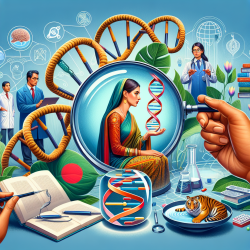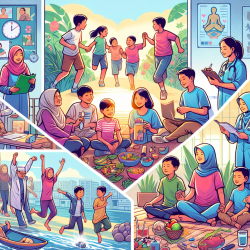In the ever-evolving field of medical genetics, the implementation of genetic counseling services in low and lower-middle-income countries like Bangladesh faces numerous challenges. According to the research article "Genetic counseling in the context of Bangladesh: current scenario, challenges, and a framework for genetic service implementation," these challenges include a lack of expertise, high costs, insufficient epidemiological data, and poor infrastructure.However, the article proposes a collaborative framework to address these issues, which can be incredibly beneficial for practitioners aiming to improve their skills in genetic counseling. Here’s how you can implement the outcomes of this research to enhance your practice:
Understanding the Current Scenario
The first step is to understand the current scenario of genetic counseling in Bangladesh. The research highlights that the country's medical education system is not adequately updated to include genetic services. Practitioners can benefit from additional training in medical genetics and genetic counseling to fill this gap.
Implementing a Collaborative Framework
The article suggests a physician-academician collaborative model to initiate genetic counseling services. This model involves:
- Training primary care physicians in basic human genetics.
- Utilizing existing facilities for initial risk assessments and sample collections.
- Sending samples to designated labs for genetic testing.
- Providing counseling based on the test results, adhering to socio-cultural, ethical, and legal standards.
Building Infrastructure and Resources
Developing infrastructure is crucial. Practitioners should advocate for the establishment of molecular diagnostics labs and genetic counseling centers. Additionally, creating a comprehensive genetic disease resource (GDR) can help in the accurate diagnosis and management of genetic conditions.
Public Awareness and Education
Raising public awareness about genetic diseases and the importance of genetic counseling is essential. Educational campaigns in schools, hospitals, and community centers can help disseminate this knowledge. Practitioners can collaborate with social activists, religious leaders, and media outlets to spread awareness.
Addressing Ethical and Legal Issues
The research highlights the need for a legal framework to support genetic counseling services. Practitioners should work with policymakers to develop regulations that address ethical concerns, such as confidentiality and the implications of genetic testing.
Encouraging Further Research
The article emphasizes the importance of further research to understand the epidemiology of genetic diseases in Bangladesh. Practitioners can contribute to this by participating in or initiating research projects, which will help in the development of effective genetic counseling services.By implementing these strategies, practitioners can significantly improve their genetic counseling skills and contribute to the development of genetic services in Bangladesh. To read the original research paper, please follow this
Genetic counseling in the context of Bangladesh: current scenario, challenges, and a framework for genetic service implementation.










